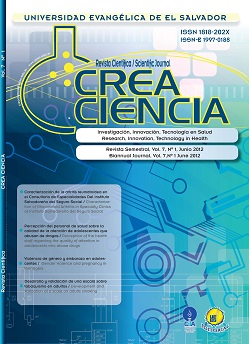Development and validation of a scale on smoking in adults
DOI:
https://doi.org/10.5377/creaciencia.v8i1.8137Keywords:
scale, reliability, validity, factorial analysis, smoking, El SalvadorAbstract
Tobacco use is one of the factors that most affect the population of developed and developing countries.
In this sense, it is necessary to build reliable measuring instruments that delve into the characteristics of smoking and that are capable of adhering to a specific social context.
Objective: To determine the level of reliability and validity of the Smoking Scale (ECT-1) applied to Salvadoran adults.
Methods: Based on 200 instruments applied (ST'J = 16.67), calculations of the Cron Bach coefficient and an exploratory factor analysis with Varimax rotation were performed.
Results: A factorial solution of two factors was obtained that explained 60.3% of the variance.
In turn, the two sub-scales (knowledge about smoking and tobacco consumption) had a high reliability coefficient.
Conclusions: The scale demonstrated a two-dimensional structure of the smoking construct "as suggested by the traditional approach to substance.
It was found that both cognitions and consumption are the fundamental criteria for the explanation of smoking.
Downloads
360
Downloads
Published
How to Cite
Issue
Section
License
© Crea Ciencia
Declaration of originality and assignment of rights
The article must be sent with a declaration of originality, responsibility and assignment of rights of copy of the manuscript, scanned and signed by the author or by one of the authors when the authorship is collective (designated author), stating that the text has not previously published in printed or electronic format, which will not be presented to any other media before knowing the decision of the journal Crea Ciencia and that, if accepted for publication, the authors transfer the copyrights in all forms and media known. At the end of six months of the publication, the text can be shared in another magazine citing the first version of the article published in Crea Ciencia and recording its number and volume. If the article is not published, the UEES agrees to return the rights enunciated to their authors.

Crea Ciencia articles are published in open access and licensed under a Creative Commons Attribution-NonCommercial 4.0 International License.

